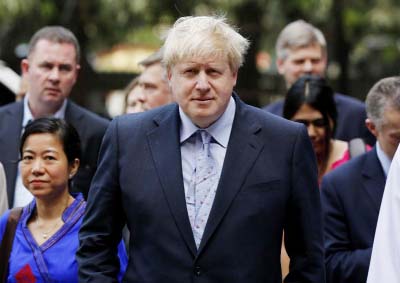
AP, Yangon :
British Foreign Secretary Boris Johnson says he’s “positive and optimistic” that the policies of newly inaugurated President Donald Trump would work in Britain’s favor.
Johnson, who is visiting Myanmar, said Saturday he was “very optimistic” a trade deal could be done quickly with the new president, once Britain had left the European Union.
In his inaugural speech, Trump declared he would put “America first” in all his decisions. But Johnson said that whatever deal was done with the U.S. “it’s got to work for the UK as well.”
He says: “I think that the new president has made it very clear that he wants to put Britain at the front of the line for a new trade deal and obviously that’s extremely exciting and important.”
Meanwhile, a day after Donald Trump became U.S. President and vowed to put “America First”, Asian media decried his isolationist policies, fearing they will chill the global economy and sow widespread international discord.
In a defiant inaugural address, Trump said U.S. workers have been devastated by an outflow of jobs overseas, one of the main themes of a divisive campaign that emphasized making America strong again.
His invitation to the event had enraged Beijing-which sees the self-ruling island as part of its own territory awaiting reunification-and sparked a diplomatic spat.
China formally asked Washington not to welcome a Taiwanese party to the inauguration, leading Yu to denounce its leader Xi Jinping as “narrow-minded.”
But, even if anger preceded the visit, Yu was all smiles on Friday after attending the event, along with parliamentarians from four Taiwanese parties.
Yu himself is a member and former chairman of Taiwan’s ruling Democratic Progressive Party, which is skeptical of cross-strait ties and defends Taipei’s autonomy.
He was enthused by the welcome he had received in Washington: “Taiwan-US relations are probably at their best right now,” he told AFP.
Almost immediately after he won the November election, Trump provoked Beijing’s ire by accepting a congratulatory call from Taiwan’s President Tsai Ing-wen.
Washington cut formal diplomatic relations with Taiwan in 1979, recognizing the Communist mainland rulers in Beijing as the sole government of “One China.”
British Foreign Secretary Boris Johnson says he’s “positive and optimistic” that the policies of newly inaugurated President Donald Trump would work in Britain’s favor.
Johnson, who is visiting Myanmar, said Saturday he was “very optimistic” a trade deal could be done quickly with the new president, once Britain had left the European Union.
In his inaugural speech, Trump declared he would put “America first” in all his decisions. But Johnson said that whatever deal was done with the U.S. “it’s got to work for the UK as well.”
He says: “I think that the new president has made it very clear that he wants to put Britain at the front of the line for a new trade deal and obviously that’s extremely exciting and important.”
Meanwhile, a day after Donald Trump became U.S. President and vowed to put “America First”, Asian media decried his isolationist policies, fearing they will chill the global economy and sow widespread international discord.
In a defiant inaugural address, Trump said U.S. workers have been devastated by an outflow of jobs overseas, one of the main themes of a divisive campaign that emphasized making America strong again.
His invitation to the event had enraged Beijing-which sees the self-ruling island as part of its own territory awaiting reunification-and sparked a diplomatic spat.
China formally asked Washington not to welcome a Taiwanese party to the inauguration, leading Yu to denounce its leader Xi Jinping as “narrow-minded.”
But, even if anger preceded the visit, Yu was all smiles on Friday after attending the event, along with parliamentarians from four Taiwanese parties.
Yu himself is a member and former chairman of Taiwan’s ruling Democratic Progressive Party, which is skeptical of cross-strait ties and defends Taipei’s autonomy.
He was enthused by the welcome he had received in Washington: “Taiwan-US relations are probably at their best right now,” he told AFP.
Almost immediately after he won the November election, Trump provoked Beijing’s ire by accepting a congratulatory call from Taiwan’s President Tsai Ing-wen.
Washington cut formal diplomatic relations with Taiwan in 1979, recognizing the Communist mainland rulers in Beijing as the sole government of “One China.”

